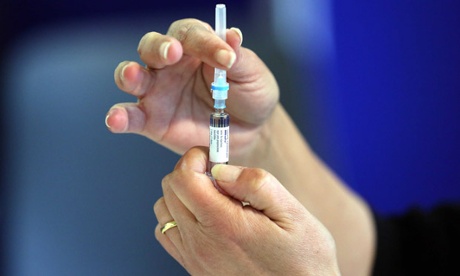Concerns that pharmacists will be unable to cope with an allergic reaction to whooping cough and measles jabs

Pharmacists in Queensland will become the first in Australia allowed to administer whooping cough and measles injections, to the chagrin of doctors.
Doctors and trained nurses are currently the only medical staff who can inject these vaccines but this will change from September.
The Australian Medical Association fears pharmacists are not properly trained to deal with allergic reactions. “We are concerned that if a patient may have a serious reaction, which is rare, that the pharmacy may not be able to cope with that,” the AMA’s Queensland president, Shaun Rudd, said. “It’s not necessarily 100% safe.
“I’m not aware it’s done in any other state in Australia.”
But the state health minister, Lawrence Springborg, said the success of an eight-month trial allowing pharmacists to administer flu vaccines gave the government confidence they could give whooping cough and measles injections to adults.
“I’d just say to anyone who might have concerns, look at the evidence,” he said in Brisbane.
“We’re dealing with pharmacists that have about five years or so of studying pharmacology and toxicology … so it’s very easy to train them to do that and they’ve got all sorts of protocols.”
Queensland’s premier, Campbell Newman, said doctors would continue administering the majority of these vaccinations.
“This is about the health of Queenslanders, not about people’s particular professional interests,” he said.
Pregnant women in Queensland will also become the first in Australia to be given free vaccines for whooping cough during their last trimester from this month.
The state government is aiming to have 95% of children and 85% of adolescents immunised against childhood diseases.
It is expanding its school immunisation program to target the human papillomavirus.
On Wednesday, the government also launched a smartphone app, known as VacciDate, which will allow parents to monitor vaccine and booster dates.
